This project is made possible through the partnership of WATER CHARITY and the NATIONAL PEACE CORPS ASSOCIATION. ![]()
This project has been completed. To read about the conclusion, CLICK HERE.
The tenth training of our Permagarden Training Initiative – Worldwide will take place in July 2018. Peter Jensen will train community volunteers with his Terra Firma Permagardens for Empowerment and Resilience course. Here is an outline of what will be accomplished in the training.
What
To provide a complete, hands-on, Four Day Terra Firma Permagarden Creation and Outreach Training
Trainer
Peter Jensen, RPCV (Haiti, 1985-87), Agroecology and Permagarden Training Specialist. Peter will be working with Gerald Nkusi, ALCDI Uganda.
Host and Local Direction
Mgahinga Community Development Organization (MCDO) and Adventure Learning and Community Development Initiatives (ALCDI)
Where
Kisoro, Uganda
When
7/23/18 – 7/28/18
Who
25 community outreach volunteers of Kisoro.
Summary
Working in partnership with Mgahinga Community Development Organization (MCDO) and Adventure Learning and Community Development Initiatives (ALCDI), both located near Kisoro, Uganda, Terra Firma International will provide Climate Resilient Nutrition focused Permagarden Training following the Terra Firma Method. 25 members of the local hillside farming community, including the Batwa people (former forest dwellers), will learn the agroecological processes necessary to build climate resilience and moisture retention within the soils of the landscape close to home and kitchen. Follow-up monitoring and evaluation will be conducted month to month by Gerald Nkusi of ALCDI and Festo Kamanzi of MCDO.
This is a rugged rural landscape of smallholder farmers growing cash crops for market yet struggle with malnutrition as all produce is taken to market! Permagardens utilize small areas of ‘waste’ land near homes so offer a solution with very limited risk. Only locally accessible organic inputs and existing tools are used in the process further increasing the likelihood of adoption and further outreach. The training output will be one Permagarden and one Terra Firma Keyhole.
25 highly motivated men and women will be trained over 4 days on how to create and teach the standard 3x3m Permagarden as well as the new innovation, the Terra Firma Keyhole. The keyhole is a small-scale version of the Perma garden which is particularly suited for the corners of outdoor kitchens and those families with extremely small land availability. The keyhole still teaches all the Terra Firma Agroecological lessons of resource assessment, carbon capture, water management, and bio-intensive soil health management and intensive plant spacing as taught in the standard Permagarden.
Staff will provide monthly follow-up site visits with all trained individuals and encourage the continuing outreach of this small, doable action-oriented, nutrition security and water management approach.
The step-by-step Terra Firma Method will be used throughout to guide learners and future trainers on how to make the most suitable all-organic, water-conserving, nutrition-focused, home garden for this particular climate and culture.
Terra Firma guides the learner to make the most informed agroecological-appropriate garden but can also be used intersectoral in public health, youth development, and small enterprise development situations as well.
All actions within the workshop will foster independence rather than dependence upon outsiders to continue. The Terra Firma method uses only the tools, plants and soil amendments that are already locally accessible to targeted beneficiaries, namely rural poor farmers, mothers, and children, enabling further adoption within the local community following training by these soon to be trainers.
Home Garden Area Before: A steep slope behind the family home will provide an outstanding venue for the training as it will highlight erosion control and water retention methods that all can easily witness during rain events.

Former Garden Area: This view shows the steep slope and barren exposed soil near the home (lower left) which will be brought under control via the keyhole.
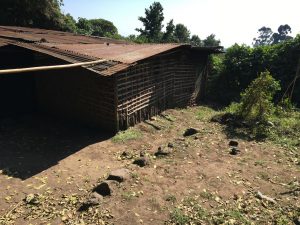
Potential Keyhole Site: The Terra Firma Keyhole will focus water runoff into a hole surrounded by a double dug berm. This will turn 1 square meter of wasted space into 2 cubic meters of the productive assets.
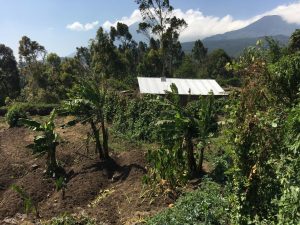
Typical Household: The stunningly beautiful landscape hides an insidious menace…this part of Uganda, known for producing the highest quality produce, is also the area of Uganda with some of the highest rates of under 5 malnutrition and stunting. This is mostly due to a lack of clean, safe water and lack of access to nutrient-dense complementary foods from birth to 3 years of age. Permagardens near kitchens can offer a way forward without being seen as a barrier to cash crop production.
Project Funding
This project has been funded by an anonymous donor. Your donation using the button below will be used for the next Perma garden project.
 Conclusion of ALCDI/MCDO Permagarden Training – Uganda
Conclusion of ALCDI/MCDO Permagarden Training – Uganda
This project has been completed under the direction of Peter Jensen, Agroecology and Permagarden Training Specialist. The training was hosted and locally organized by Mgahinga Community Development Organization (MCDO) and Adventure Learning and Community Development Initiatives (ALCDI)
To read about the start of the project, CLICK HERE.
Peter reports:
This was a marvelous training with a great group of committed individuals. I feel very strongly that the leadership of both local organizations will provide us with good feedback and ongoing support in the community.
The Permagarden Training funded by Water Charity in support of ALCDI and the Mgahinga Community Development Organization was a huge success. The very enthusiastic group of 25 men and women from the farming communities near the Mgahinga Gorilla National Park near Kisoro, Uganda is excited to take the water control, soil health and plant management skills they learned in the garden to their own homes and even into portions of their cash crop farm production fields. The small doable action approach gave them the confidence they needed to return home to do similar work in their own homes.
Gerald Nkusi, Director of ALCDI and Festo Kamanzi, Director of MCDO, will spearhead the outreach that is planned over the coming months leading up to the rain season which begins in October and will report back on challenges and successes throughout the year. Having strong representation from the marginalized but evolving Batwa community (the former forest dwellers who were removed from the forest in the early 90s and have been struggling ever since) gave the Terra Firma Team a marvelous opportunity to reach into and assist this vulnerable group with tangible practical actions that come at no risk.
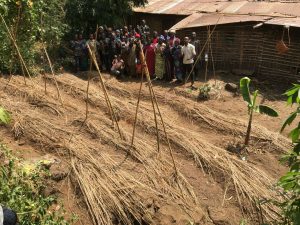
The Completed Permagarden: The formerly eroded and compacted soil near this typical group home is now fully prepared for whatever the climate may bring. Water directing swales and berms protect the double dug and intensively planted garden beds in the middle. A Terra Firma Keyhole can be seen in the lower right near the roof. This simple first step guided the group to accept the larger challenge of the hillside.
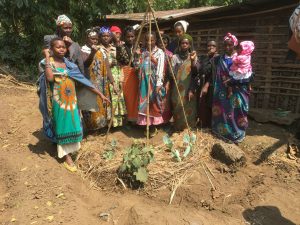
The Completed Keyhole: Women from the Batwa Community show off their completed water-capturing keyhole garden. Using all the steps and skills needed for the larger space, the keyhole can be created in a very short period of time. This practice increases the positive attitude that larger landscape change is also possible, if done in small manageable steps. Note the handwashing ‘tippy tap’ in the center which waters the emerging plants while also providing key lessons on ‘drip irrigation’.
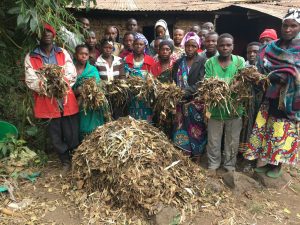
Creating the Subsoil Food: Dry Brown Carbon Organic Material is brought in from the surrounding environment. This will be added to the subsoil during the ‘Double Dig’ process. All of this material will slowly decompose and allow the subsoil to release its natural fertility while also holding the copious amounts of rainfall for the long stretches when no rain falls.
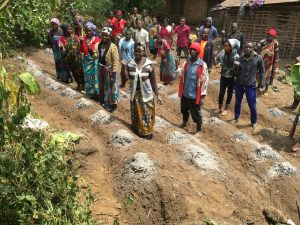
Feeding the Topsoil: Locally accessible char, wood ash and manure is added to the top 20 cm of each berm and bed within the garden. These organic materials come at no cost to the local farmers and gardeners but are actually far superior to the costly fertilizer available but inaccessible to this remote farming community.
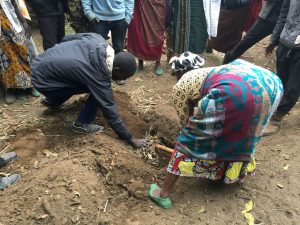
Feeding the Subsoil: Men and women, from different communities, working side by side to improve soil health, tilth and water-holding ability by ‘feeding’ the subsoil during the double dig. This was during the creation of the Terra Firma Keyhole.
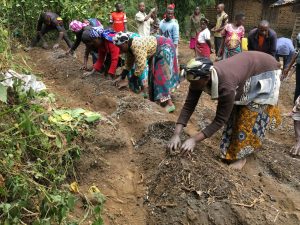
Careful Blending: Great care is taken to properly blend the organic topsoil ingredients into the fragile berms and beds. All are smoothed and mulched to capture rain while preventing surface erosion.

Keyhole Planting: The bio-intensive planting technique is carefully demonstrated within the smaller keyhole garden bed. The group then has the knowledge and skills to do the same on the larger permagarden. The keyhole itself is 1/8 cubic meter. During a rain event, the roof will generate a huge amount of water in a short time which will flow into the hole and then around the garden bed that circles it. When full, this hole will be holding 125 liters of visible water! This does not include the water that has already been absorbed within the beds. This visible capture is highly motivating for further keyhole creation.
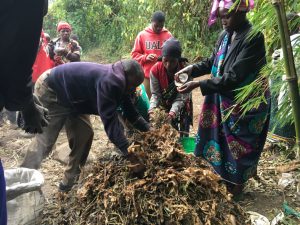
Making the Compost: A critical technique for ongoing garden success is simple compost creation. Local brown and green waste is blended with a small amount of manure and water. It is then covered and mixed every 2 weeks for 2 months at which point it will be a powerful source of soil nutrition, fertility and moisture for the ongoing crop production.
We extend our thanks to Peter for completing this important project.